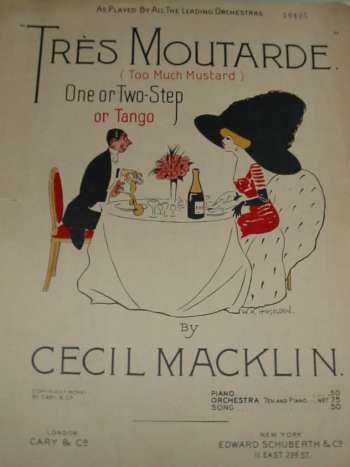My Funny Valentine
The sheet music of yesterday! Faded, dog-eared, and torn, it is an astonishing heap of mementos that seem as lost in the recesses of time and as fruitless to scan as someone else's old valentines.– Rudi Blesh and Harriet Janis, They All Played Ragtime, p. 5
It's true, I might question the value of my interest in these corny, baffling, and sometimes offensive songs published long ago. But there are other aspects of yesterday's Hit Parade to consider.
Over the greatness of such space
Steps must be gentle– Hart Crane, "My Grandmother's Love Letters"
A few years back I had earnest, obsessive interest in current music. I worked in record stores, socialized with musicians, and never let an issue of Option magazine go unread. But sometime in the early 1990s I stopped caring about all this. Part of it was my realizing how much keeping current was related to endless, unsustainable consumption– buying the latest release of Band XYZ– and superficial status– one is cool for having bought the latest release of Band XYZ.
I started engaging in something like anticonsumption: I listened only to music I found in LP format at libraries. Since budget cuts made new acquisitions almost impossible, library music choices tended to the quaint, being leftovers from California's golden age of infrastructure. The music selections seemed to be either ethnographic (lots of Nonesuch and Folkways) or middle-of-the-road (no acid rock, but postwar jazz and vocals). San Francisco State University's library had a remarkable selection of mid-century Blue Note releases, as well as the Raymond Scott 10" that entertained me until the overplayed "Powerhouse" skipped.
This marinade in the music of olden times schooled me in the concept of the standard, versus that of the cover version. A pop or jazz standard is a song released to all performers. Nobody must sound like Dinah Washington when singing "What a Diff'rence a Day Made," which is why Jamie Cullum could perform it so effectively here at the Paramount in June, and why neither vocalist must shape the performance to resemble the original "Cuando Vuelva a Tu Lado", a Mexican bolero from 1934.
It's even more enthralling to hear contemporary recordings of these decades-old songs. Not everything's out on CD yet, regrettably, but the freeform world of podcasting promises to take up the slack:
- Podcasts from Radio WFMU, including the riveting Thomas Edison's Attic and the Antique Phonograph Music Program.





0 Comments:
Post a Comment
<< Home